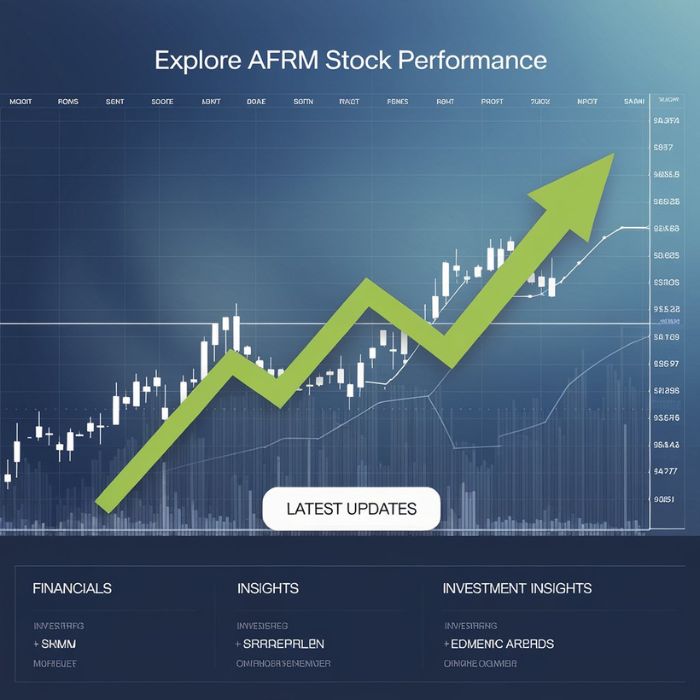Overview
The world of finance is always in flux, and for investors, keeping a finger on the pulse of market movements can feel like navigating a labyrinth. Among the intriguing stocks to watch is Affirm Holdings Inc., commonly known as AFRM. This fintech company has made waves with its buy-now-pay-later model, appealing to consumers eager for flexible payment options. But how does the current economic landscape impact its valuation?
With rising interest rates, fluctuating consumer confidence, and evolving spending habits, it’s essential to dissect these factors that shape AFRM’s future. In this article, we’ll explore how economic changes are influencing AFRM stock and what it might mean for potential investors looking to make informed decisions in today’s unpredictable market climate. Let’s dive into the numbers and trends that matter most!
Economic Factors Affecting AFRM’s Value
AFRM, or Affirm Holdings, operates in the rapidly evolving buy now, pay later market. Economic shifts play a crucial role in its valuation.
Inflation has been a significant concern lately. Rising prices can impact consumer spending habits. If households tighten their budgets due to higher costs, AFRM’s transaction volume might decline.
Interest rates also influence borrowing behavior. As central banks adjust rates, consumers may find credit more expensive. This could lead to reduced demand for financing options like those offered by Afrm Stock.
Additionally, economic growth indicators such as employment rates and wage growth affect consumer confidence. Strong job markets typically encourage spending and investment in services like Affirm’s offerings.
Global events can disrupt financial stability too. Trade tensions or geopolitical issues may create uncertainty that impacts investor sentiment toward stocks like AFRM. This environment requires close monitoring of macroeconomic trends and their implications on valuations.
Industry Trends and Competition
The buy now, pay later (BNPL) industry is evolving rapidly. With increasing consumer demand for flexible payment options, companies like Affirm Holdings (AFRM) are at the forefront of this trend.
Traditional credit models face challenges as younger consumers prefer seamless digital experiences. They seek quick approvals and straightforward terms without hidden fees. This shift in preference creates opportunities for AFRM to establish a strong market presence.
However, competition is fierce. Players such as Afterpay and Klarna continue to innovate and expand their offerings. Each brand strives to capture more market share through partnerships with retailers or unique promotional strategies.
Regulatory scrutiny also looms large over the BNPL sector. As regulators focus on consumer protection, companies must adapt swiftly while maintaining growth trajectories.
Navigating these dynamics will be crucial for AFRM’s long-term success in a crowded marketplace filled with both established players and emerging startups.
Financial Performance and Growth Potential
AFRM has shown a mixed bag of financial results recently. While revenues have increased, the company grapples with rising costs that impact profitability. Investors are keenly watching these margins.
The growth potential remains strong due to the increasing demand for buy now, pay later services. This trend aligns well with changing consumer behaviors favoring flexible payment options.
Moreover, strategic partnerships could further enhance AFRM’s market reach. Collaborations with major retailers might drive user engagement and transaction volumes.
However, it’s essential for investors to keep an eye on cash flow metrics, as they indicate how well the company can sustain its operations during economic fluctuations.
While optimistic projections exist, achieving consistent growth will require navigating various challenges effectively.
Risks and Opportunities for AFRM Investors
Investing in AFRM stock presents a mix of risks and opportunities. One significant risk is the volatility often associated with tech-driven companies. Market sentiment can shift rapidly, impacting share prices unexpectedly.
Economic fluctuations also pose challenges. Rising interest rates could dampen consumer spending, affecting AFRM’s core business model focused on buy-now-pay-later services. Regulatory changes in this space may introduce additional hurdles, complicating growth prospects.
On the flip side, there’s potential for substantial upside. The increasing popularity of alternative payment solutions could drive demand for AFRM’s offerings. Partnerships with major retailers can enhance visibility and user adoption.
Moreover, as financial technology continues to evolve, innovative features might set AFRM apart from its competitors. Investors holding onto their shares during turbulent times could reap rewards if the company capitalizes on these emerging trends effectively.
Expert Insights and Market Predictions
Analysts are closely monitoring AFRM amid shifting economic landscapes. Many believe that the company’s innovative approach to buy-now-pay-later (BNPL) services positions it well against traditional financing options.
Some experts highlight a potential slowdown in consumer spending as a critical factor. With inflationary pressures, discretionary purchases may decline, impacting AFRM’s transaction volume. This could weigh heavily on revenue projections.
On the other hand, there’s optimism around increasing digital payments and e-commerce growth. As more consumers embrace online shopping, AFRM might capture significant market share if it adapts quickly to evolving trends.
Predictions vary widely among market analysts. Some see potential for recovery driven by strategic partnerships and product enhancements, while others remain cautious about short-term volatility. Watching these developments will be key for investors looking at the future of AFRM stock performance.
Is AFRM a Good Investment in the Current Economic Climate?
Investing in AFRM stock today presents a mixed bag of opportunities and challenges. The current economic climate, characterized by rising interest rates and inflation, affects consumer spending power. This could impact companies like Affirm Holdings.
On the upside, the shift towards digital payments is gaining momentum. More consumers are embracing buy now, pay later options. This trend can potentially benefit AFRM as it expands its market share.
However, competition remains fierce. Established players and new entries are vying for dominance in this space. Investors should monitor how well AFRM innovates to stay ahead.
Additionally, regulatory scrutiny around fintech services may pose risks that cannot be ignored. Understanding these dynamics will be crucial for those considering an investment in AFRM amid fluctuating economic conditions.
Final Thoughts
AFRM stock analysis reveals a complex landscape shaped by various economic factors. The evolving financial environment poses both challenges and opportunities for the company. Investors must consider how inflation rates, interest rates, and consumer spending habits can influence AFRM’s valuation.
Additionally, understanding industry trends is crucial. As competition intensifies within the buy now pay later sector, AFRM will need to differentiate itself to capture market share effectively.
Examining its financial performance sheds light on growth potential but also exposes risks that investors should be aware of. With changing economic conditions and increasing competition, it’s essential to remain vigilant about these influences.
Expert insights provide valuable perspectives on what lies ahead for AFRM. Market predictions vary widely based on current data and sentiment in the fintech space.
As you weigh your investment options regarding AFRM stock, consider both the short-term volatility and long-term prospects influenced by macroeconomic changes. Keep an eye on key indicators that may signal shifts in the company’s trajectory moving forward.











